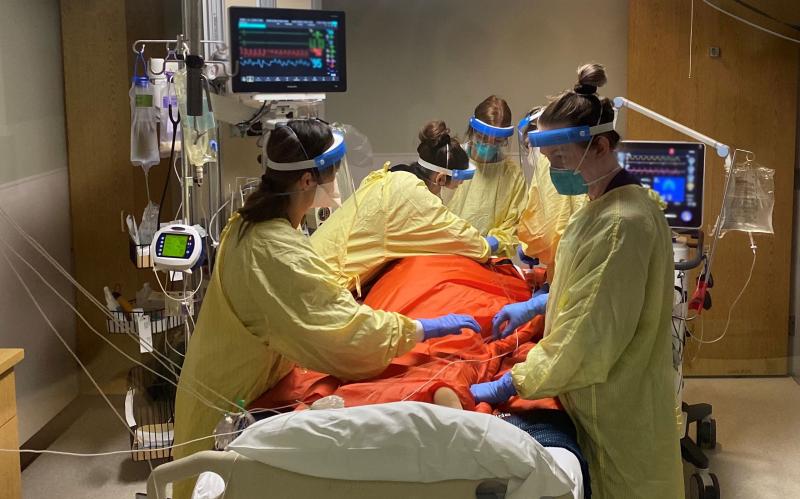Moral Injury within Canadian Frontline Healthcare Workers
Operationalizing the Concept of Moral Injury within Canadian Frontline Healthcare Workers: An Inductive, Grounded Theory Analysis
Research Team:
Michelle McCarron1, Oluwasegun Hassan1, Fiona Fick1, Yousef Omar2, R. Nicholas Carleton3, Amber Fletcher3, Lorraine Smith-MacDonald4, Brandace Winquist1, Melody Isinger1, Donna Milo1, & Suzette Brémault-Phillips4
1Saskatchewan Health Authority
2University of Saskatchewan
3University of Regina
4University of Alberta
Throughout the pandemic, there has been an acknowledgement of the considerable strain being experienced by members of the healthcare workforce. While discussions about supporting healthcare workers often focus on strategies for self-care and addressing burnout, a new way of thinking about the impact of working in stressful and morally challenging situations is gaining more attention.
Moral injury—a combination of emotional, behavioural, physical, and/or spiritual harm—can occur when individuals experience stressful or traumatic situations in which they are forced to do, witness, or are unable to prevent, something that goes against their strongly held values and beliefs.
Dr. Michelle McCarron, a Research Scientist in the SHA, is leading a team of researchers in a study to better understand situations that may lead to the development of moral injury in frontline healthcare workers and the signs and symptoms of moral injury in this population.
“COVID-19 has presented a unique challenge for many frontline healthcare workers, where they may find themselves in situations where there is no ideal outcome,” says McCarron. “How does someone deal with difficult choices about who will be prioritized for care when resources are limited? What happens if someone is under time pressure to prepare a room in order to meet the demand for services, but worries that this could impact their ability to sterilize it thoroughly? How does one deal with enforcing family visitation policies meant to reduce the spread of COVID but that at the same time, may have a negative impact on the mental health of the patients and families these measures are meant to protect? These types of situations can take a toll on people over time.”
The team recruited participants for this study from multiple professions (e.g., support services, therapies, nursing, medicine), in a variety of healthcare settings (e.g., hospitals, long-term care, public health) throughout the province.
One participant described her experience working in a long-term care facility around Christmas last year: “So basically we would push residents up to the window, and we’d open the window. It would be cold because it’s the middle of December, so we covered them in blankets. And then family would be standing outside freezing and scream at the window, ‘I love you!’ And it’s like, I’m just watching there by the desk and I was crying my eyes out because I can’t imagine if that was me. If I was alone in a place, I was sitting in a place where everybody were strangers to me because they’re not my family, and be excited about the fact that it’s Christmas and that means I get to see my family, but then this young girl working here would tell me that I can’t see my family, and that’s the best they can do for me, basically to have them scream at me through a glass window.”
Despite their struggles, people also found glimmers of hope that helped to restore their faith in humanity. One person shared a story from when the first vaccines were starting to be distributed. They said: “They were doing Astra Zeneca at the drive-through and this was not very long after all of the ‘Oh, nobody wants to get the Astra Zeneca.’ And I drove past and there were cars lined up and I just started to cry. And I can’t even really identify exactly why I was crying, but it was just I think a kind of a sense of relief that people are still going even though there’s all of this controversy, if you will, around it. Yeah and just – maybe like a little bit of happiness and just like a sense of ‘we’re still going to get through this’ but then afterwards I was like, well, that’s probably not a real normal reaction. Like the Average Joe probably doesn’t drive past the drive-through site and start crying because there are people getting vaccinated. But then, when I was talking with friends of mine who work in healthcare, you know, they have the same reaction. One of my friends told me they can see the drive-through from the windows of the hospital and they go on break and that’s what they do. They just stand and watch the drive-through and just monitor how many people are going.”
A total of 37 healthcare workers across Saskatchewan participated in interviews about their experiences of providing care during the COVID-19 pandemic. Analyses are ongoing and a detailed report is expected in early 2022.
This research was funded by Canada’s Department of National Defense, as part of its Innovation for Defence Excellence and Security (IDEaS) COVID-19 Challenges program (CPCA-0622). The team also wishes to acknowledge the support received by the Saskatchewan Health Authority for this study.



